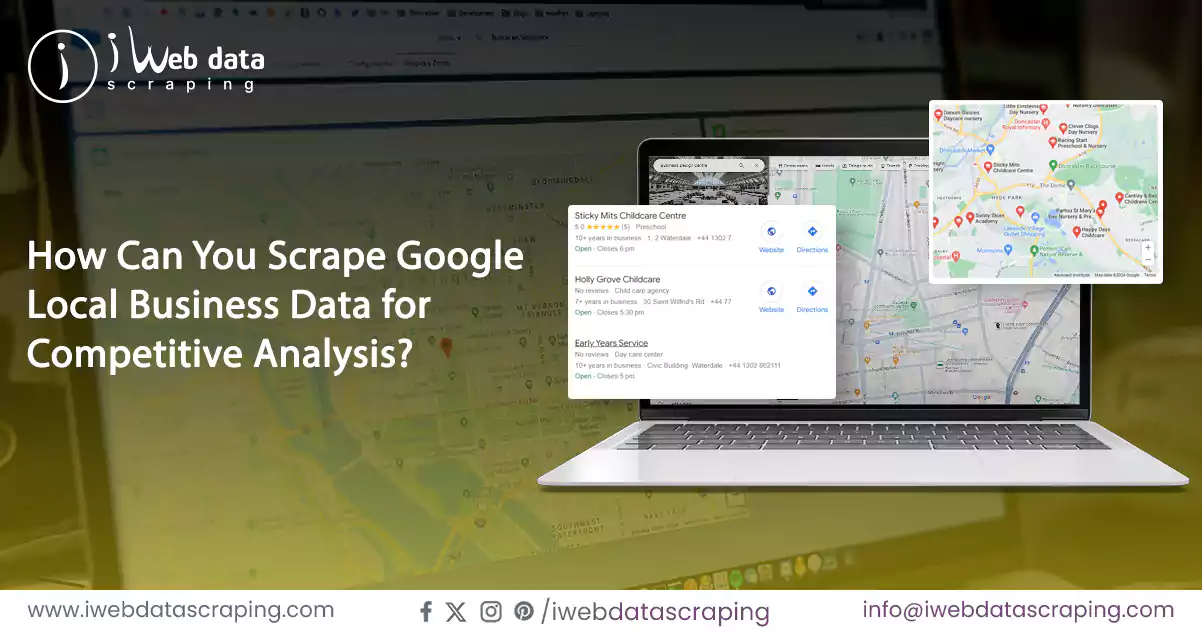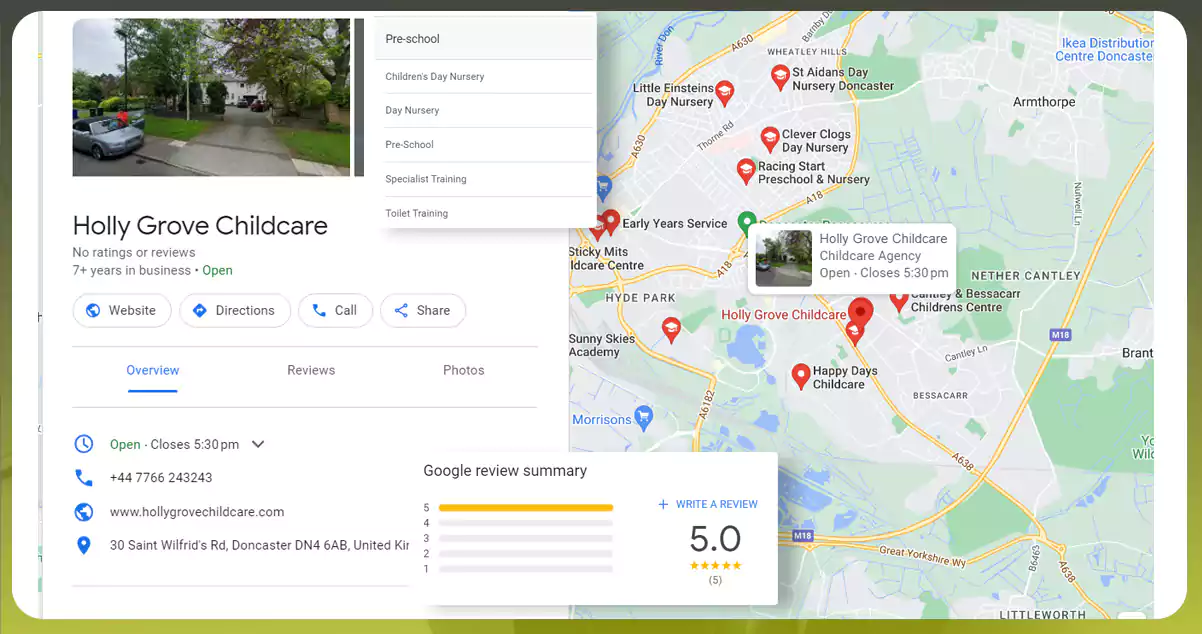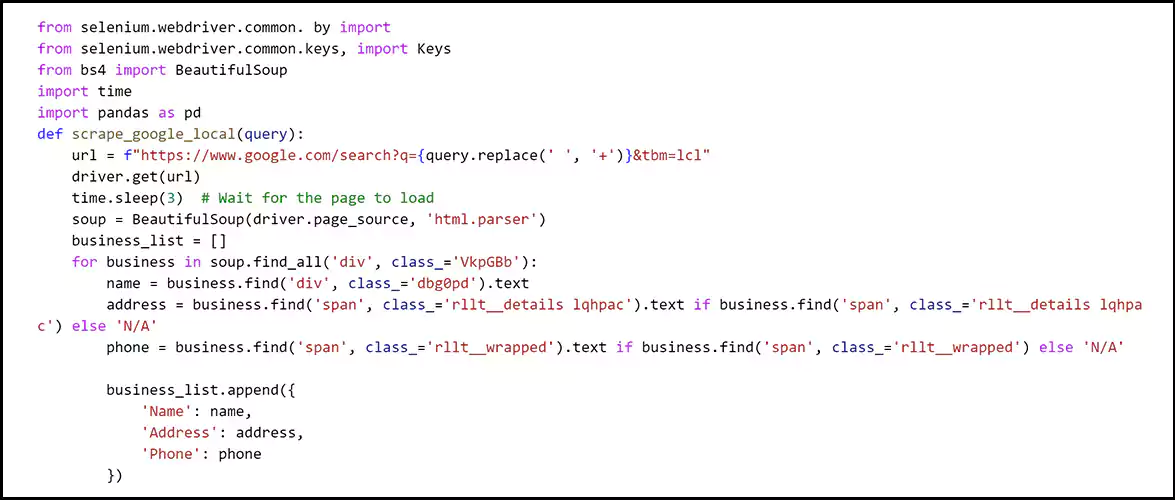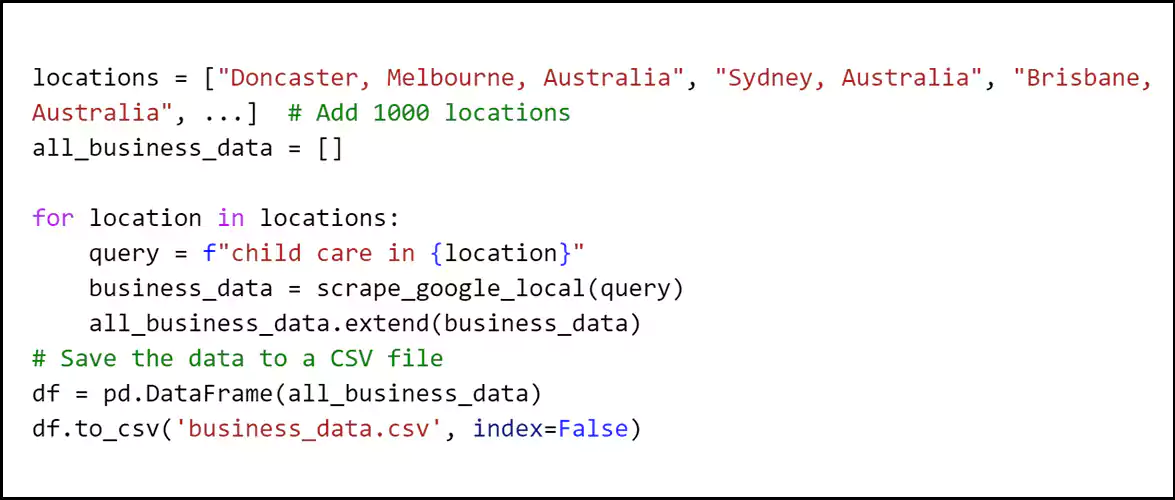How Can You Scrape Google Local Business Data for Competitive Analysis?
How Can You Scrape Google Local Business Data For Competitive Analysis?
Scraping business data from Google Local involves collecting information about businesses listed in Google’s local search results for specific queries. This task can benefit market research, competitor analysis, or the creation of a local business directory. This guide will explore the steps required to scrape Google local business data for 1000 locations using a query similar to “child care in Doncaster, Melbourne, Australia.”
Types of Data Collected from Google Local Businesses
Google Local Businesses can provide a variety of data points, including:
Business Information: Name, address, phone number (NAP), website, business hours, and categories.
Reviews and Ratings: User-generated reviews and ratings that can provide insights into customer satisfaction.
Photos: Images uploaded by users or the business owner showing the exterior, interior, products, and services.
Popular Times: Data showing when a business is typically busy, helping customers plan their visits.
Questions and Answers: User-generated questions and answers about the business, providing additional context.
Attributes: Specific features or amenities of a business, such as wheelchair accessibility, outdoor seating, or pet-friendly policies.
Website and Appointment Links: Links to the business’s website or appointment booking system.
Google Maps Data: Location data, including latitude and longitude, can be used for mapping and directions.
Related Businesses: Suggestions for similar businesses that users might be interested in.
This data is valuable for consumers looking for information about businesses and for businesses to understand their customers and manage their online presence.
Significance of Scraping Google Local Businesses
Scraping Google Local businesses offers numerous advantages for businesses and researchers. Here are eight key points highlighting its significance:
Market Research: By gathering data on local businesses using Google Business Data Scraper, companies can analyze market trends, identify gaps, and understand customer preferences in different regions.
Competitor Analysis: Scraping business data helps track competitors’ offerings, pricing strategies, and customer reviews, providing valuable insights for competitive positioning.
Lead Generation: Businesses can use the scraped data to generate leads by identifying potential clients or partners in specific locations.
Local SEO Optimization: Understanding the landscape of local businesses allows companies to optimize their local SEO strategies, improving their visibility in local search results.
Business Directory Creation: The data can be used to create comprehensive business directories, aiding consumers in finding relevant services or products nearby.
Franchise Expansion: Companies planning to expand their franchises can use the data to identify lucrative locations and understand the competitive landscape in those areas.
Advertising Strategies: With detailed information on local businesses, advertisers can tailor their campaigns to more effectively target specific regions.
Customer Insights: Analyzing reviews and ratings using Google Business data scraping services helps understand customer sentiments and improve service offerings accordingly.
Tools and Prerequisites
To effectively scrape business data from Google Local, you will need the following tools and prerequisites:
Python is a powerful programming language widely used for web scraping tasks.
BeautifulSoup: A Python library for parsing HTML and XML documents.
Selenium: A browser automation tool that can help navigate web pages and interact with dynamic content.
Google Maps API: Optional for gathering additional location data if needed.
Proxies: To avoid getting blocked by Google for making too many requests.
Excel/CSV Libraries: These are used to save scraped data in a structured format.
Step-by-Step Guide
Step 1: Setting Up Your Environment
First, ensure you have Python installed on your system. You can download it from python.org. Once Python is installed, you can install the necessary libraries using pip:
pip install beautifulsoup4 selenium pandasStep 2: Configure Selenium
Selenium requires a web driver to interact with the browser. For example, if you use Chrome, you must download the ChromeDriver from the official site. After downloading the ChromeDriver, set it up in your Python script:
Step 3: Define the Query Structure
Next, define the structure of your Google search query. For instance, if you are looking for childcare services in different locations, your query might look like this:
query = "child care in Doncaster, Melbourne, Australia"You will need to modify this query dynamically for each of the 1000 locations you are interested in.
Step 4: Scrape Business Data
Here is a Python function that uses Selenium to scrape business data from Google Local search results:
Step 5: Loop Through Multiple Locations
Create a list of 1000 locations and loop through each, calling the scrape_google_local function for each location. Here’s how you can do it:
Step 6: Handle IP Blocking
Google may block your IP if it detects too many requests quickly. To mitigate this, you can use proxy servers or implement a delay between requests:
Step 7: Optimize and Scale
You should optimize your script for performance and reliability for a large-scale scraping task like this. Consider the following tips:
Use Proxies: Rotate IP addresses using proxy services to avoid getting blocked.
Parallel Processing: Use multi-threading or distributed computing frameworks like Apache Spark to speed up the process.
Error Handling: Implement robust error handling to manage issues like timeouts and network errors gracefully.
Data Validation: Ensure that the scraped data is accurate and consistent.
Conclusion: Scraping business data from Google Local for 1000 locations is a complex task that requires careful planning and execution. Using tools like Selenium and BeautifulSoup, combined with strategic use of proxies and delays, you can gather valuable data for market research, competitor analysis, or business directory creation. Always comply with legal and ethical guidelines when scraping data from the web.
Discover unparalleled web scraping service or mobile app data scraping offered by iWeb Data Scraping. Our expert team specializes in diverse data sets, including retail store locations data scraping and more. Reach out to us today to explore how we can tailor our services to meet your project requirements, ensuring optimal efficiency and reliability for your data needs.
Know more: https://www.iwebdatascraping.com/scrape-google-local-business-data-for-competitive-analysis.php







